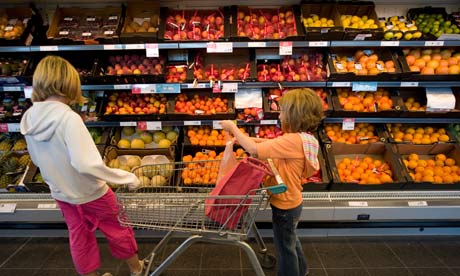
Lidl is to trial a dedicated "healthy checkout" in each of its 600 stores, replacing chocolate and sweets at the till with more nutritious alternatives.
The move is one of a number of initiatives being announced by supermarkets and other retailers as part of the Responsibility Deal announced by the Department of Health, an on-going scheme to promote action within the food industry to encourage people to eat more healthily.
Lidl's checkout displays will only include items high in nutritional value such as multi-vitamin juice, fruit and water, and form part of a family friendly initiative to help parents avoid "pester power" and make more sensible choices during their family shop. The scheme could eventually be adopted permanently.
More fruit and vegetables will be added to ready meals, and supermarket fruit and vegetable sections will be expanded to help people reach the five-a-day benchmark, public health minister Anna Soubry announced.
But the voluntary deal, launched by the coalition government in March 2011, continues to attract controversy for allowing fast food firms, drinks makers and supermarket chains to help shape its approach to public health without being subjected to further legislation.
Malcolm Clark of the Children's Food Campaign, said: "Moves to help us get closer to eating our recommended five-a-day are always welcome. But if we want to promote children's health we also need to protect them from marketing that encourages them to eat fatty, sugary, salty food. We also need everyday products to be reformulated so they are healthier.
"By not taking a tougher stance on protecting children from the marketing of unhealthy food and drink the government continues to let our most prominent food manufacturers and retailers off the hook."
Squeezed budgets are a major factor in deterring healthy eating, according to consumer groups such as Which?.
Rising food bills played a big part in this week's inflation jump, and government figures show fruit and vegetable consumption is falling among the poorest families: the lowest 10% of households by income reduced purchases of fruit and vegetables by 20% between 2007 and 2010.
Among the other intiatives being unveiled, supermarket chain Aldi will increase the amount of store space dedicated to fresh produce and feature its new discounted "Super 6" fruit and vegetable lines in its promotional activities including TV advertising.
The Co-op will put money-off coupons on fresh, frozen and canned produce, while Iceland will offer coupon deals on fruit and vegetables, increase promotional activity to customers using its website and social media features, and introduce new fruit and vegetable products.
Sainsbury's will offer seven different 80g fruit bags as part of its £3 meal deal promotion to help customers eat more fruit at lunchtime.
"Getting your five-a-day can help lower the risk of serious health problems, such as heart disease and some cancers, but we know that can be a challenge," Soubry said. "Through the Responsibility Deal we have already achieved real progress in helping people cut the calories and salt in their diet. All of the major supermarkets have now committed to removing artificial trans fats, and over 70% of fast food and takeaway meals sold on the high street have calories clearly labelled."
British Retail Consortium food director Andrew Opie said: "Retailers are supporting this pledge. They recognise how important it is to use innovative products, prominent promotions and competitive pricing to encourage people to eat more fruit and vegetables. I hope this public commitment nails the myth that eating healthily is expensive."

